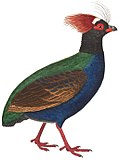In Greek mythology, the Meleagrids were Calydonian princesses as the daughters of Queen Althaea and King Oeneus, and sisters of the hero Meleager.

Fowl are birds belonging to one of two biological orders, namely the gamefowl or landfowl (Galliformes) and the waterfowl (Anseriformes). Anatomical and molecular similarities suggest these two groups are close evolutionary relatives; together, they form the fowl clade which is scientifically known as Galloanserae. This clade is also supported by morphological and DNA sequence data as well as retrotransposon presence/absence data.
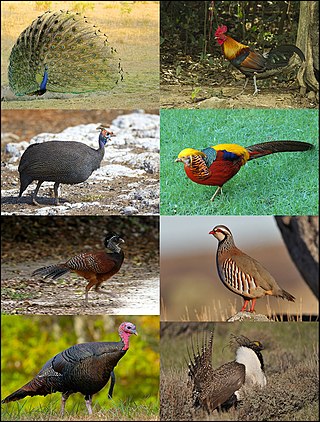
Galliformes is an order of heavy-bodied ground-feeding birds that includes turkeys, chickens, quail, and other landfowl. Gallinaceous birds, as they are called, are important in their ecosystems as seed dispersers and predators, and are often reared by humans for their meat and eggs, or hunted as game birds.

Guineafowl are birds of the family Numididae in the order Galliformes. They are endemic to Africa and rank among the oldest of the gallinaceous birds. Phylogenetically, they branched off from the core Galliformes after the Cracidae and before the Odontophoridae. An Eocene fossil lineage Telecrex has been associated with guineafowl; Telecrex inhabited Mongolia, and may have given rise to the oldest of the true phasianids, such as blood pheasants and eared pheasants, which evolved into high-altitude, montane-adapted species with the rise of the Tibetan Plateau. While modern guineafowl species are endemic to Africa, the helmeted guineafowl has been introduced as a domesticated bird widely elsewhere.

The helmeted guineafowl is the best known of the guineafowl bird family, Numididae, and the only member of the genus Numida. It is native to Africa, mainly south of the Sahara, and has been widely introduced, as a domesticated species, into the West Indies, North America, Colombia, Brazil, Australia and Europe.
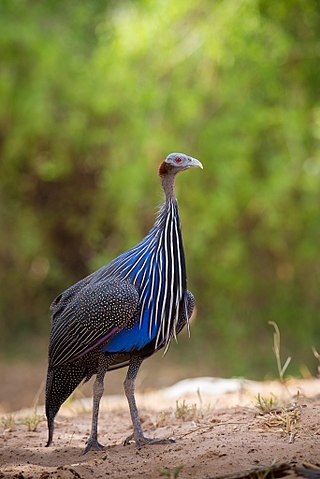
The vulturine guineafowl is the largest extant species of guineafowl. Systematically, it is only distantly related to other guineafowl genera. Its closest living relative, the white breasted guineafowl, Agelastes meleagrides inhabit primary forests in Central Africa. It is a member of the bird family Numididae, and is the only member of the genus Acryllium. It is a resident breeder in northeast Africa, from southern Ethiopia through Kenya and just into northern Tanzania.

The crested guineafowl are a group of three species and members of the Numididae, the guineafowl bird family. They are found in open forest, woodland and forest-savanna mosaics in sub-Saharan Africa.

Guttera is a genus of birds in the family Numididae. Established by Johann Georg Wagler in 1832, it contains four species:

The plumed guineafowl is a member of the guineafowl bird family. It is found in humid primary forest in Central Africa. It resembles some subspecies of the crested guineafowl, but has a straighter and higher crest, and a relatively long wattle on either side of the bill. The bare skin on the face and neck is entirely dull grey-blue in the western nominate subspecies, while there are a few orange patches among the grey-blue in the eastern subspecies schubotzi.
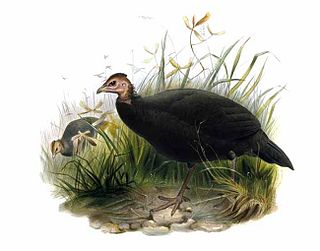
The black guineafowl is a member of the guineafowl bird family. It occurs in humid forests in Central Africa. It is a medium-sized black bird with a bare, pink head and upper neck. Little is known of its behaviour.
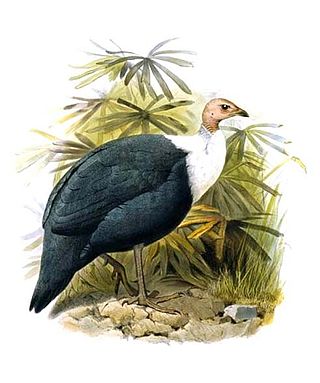
The white-breasted guineafowl is a medium-sized, up to 45 cm long, terrestrial bird of the guineafowl family.
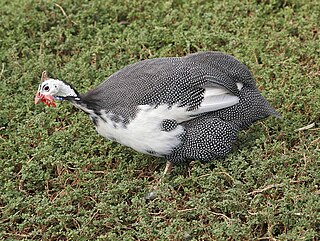
Domestic guineafowl, sometimes called pintade, pearl hen, or gleany, is poultry originating from Africa. They are the domesticated form of the helmeted guineafowl and are related to other game birds such as the pheasants, turkeys and partridges. Although the timing of their domestication is unknown, there is evidence that domestic guineafowl were present in Greece by the 5th century BC.

Count Robert of Paris (1832) was the second-last of the Waverley novels by Walter Scott. It is part of Tales of My Landlord, 4th series, along with Castle Dangerous. The novel is set in Constantinople at the end of the 11th century, during the build-up of the First Crusade and centres on the relationship between the various crusading forces and the Byzantine Emperor Alexius I Comnenus.

The Orange River francolin is a species of bird in the family Phasianidae found in grassland and woodland in Africa. In the taxa from the northern part of its distribution, the neck-line does not reach the eye and the belly is whitish. In the southern taxa the neck-line reaches the eye and the belly is buff. This has led some authorities to treat them as separate species: The Archer's or acacia francolin in the north, and the Orange River francolin in the south.

The moorland francolin is a species of bird in the family Phasianidae. It is endemic to Ethiopia.

Phasianoidea is a superfamily of birds of the order of the Galliformes.

A locrio is a rice dish from the Dominican Republic. Similar to pilaf, jollof, and paella, it consists of seasoned rice with some kind of meat, such as chicken, Dominican salami or pork.
Guineafowl are birds of the family Numididae, including:
Telecrex is an extinct genus of birds related to guineafowl, containing two species, Telecrex grangeri and Telecrex peregrinus. T. grangeri is known from a single partial femur from Eocene deposits in Inner Mongolia, while T. peregrinus was found in France.


















